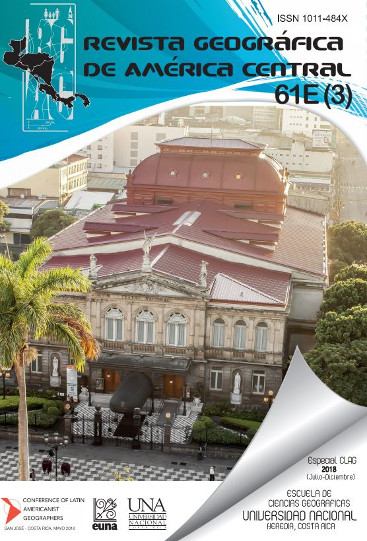Energy transition and path dependence: the case of Costa Rica
DOI:
https://doi.org/10.15359/10.15359/rgac.61-3.14Keywords:
path dependence, energy transition, evolutionary economic geography, renewable energyAbstract
Costa Rica’s world known renewable energy model relies heavily on large scale hydropower, a source surrounded by strong environmental and social questionings. This condition of dependence has its own reinforcing processes that hinder advancements of alternative renewable technologies. In today’s carbon-constrained world, new approaches – and new geographies – are required to ensure the availability and accessibility of sustainable energy services. Using path dependence theory developed within evolutionary economic geography and neoinstitutionalist school of thought, the present research offers an explanation of the specific path driven by the impact of historical events that favor hydropower in Costa Rica’s energy transition.
References
Boschma, R., & Martin, R. (2012). The Handbook of Evolutionary Economic Geography. (R. Boschma, & R. Martin, Edits.) Cheltenham, U.K.: Edward Elgar Publishing.
Bradford, T. (2006). Solar revolution: the economic transformation of the global energy industry. Cambridge - MA, U.S.A. : MIT Press.
Brenner, N. (2004). New state spaces: urban governance and the rescaling of statehood. Oxford, U.K.: Oxford University Press.
Brenner, N., Jessop, B., Jones, M., & Macleod, R. (. (2003). State/Space: A Reader. Oxford, U.K.: Blackwell Publishing.
Bull, B. (2005). Aid, power and privatization: The politics of telecommunication reform in Central America. Cheltenham, U.K.: Edward Elga Publishing.
Castro, R., Porras, J., & Jiménez, G. (2009). Alternativas para el mejor aprovechamiento de la electricidad en Costa Rica. Ambientales, 37, 3-12.
Emmerson, C., & Stevens, P. (2012). Maritime Choke Points and the Global Energy System: Charting a Way Forward. Chatham House Briefing Paper. London, U.K.: Chatham House (the Royal Institute of International Affairs).
Fendt, L. (30 de March de 2015). The truth behind Costa Rica’s renewable energy. Obtenido de The Guardian: https://www.theguardian.com/commentisfree/2015/mar/30/truth-behind-costa-rica-renewable-energy-reservoirs-climate-change
Fouquet, R. (2016). Path dependence in energy systems and economic development. Nature Energy, 1. Obtenido de http://eprints.lse.ac.uk/67119/1/Fouquet_Path%20dependence_2016.pdf
García, D. (2012). Decision making and the energy path towards carbon neutrality: the case of Costa Rica. Berlin Conference on Evidence for Sustainable Development. Berlin, Deutschland: Environmental Policy Research Centre (FFU) - Freie Universität Berlin .
García, D. (2014). Solar energy and the problem of path dependence in Costa Rica’s energy system. Hamburg, Deutschland: Dissertation zur Erlangung der Würde einer Doktorin der Wirtschafts und Sozialwissenschaften, Fakultät Wirtschaft und Sozialwissenschaften, Universität Hamburg.
Henning, M., Stam, E., & Wenting, R. (2012). Path dependence research in regional economic development: Cacophony or knowledge accumulation? Papers in Evolutionary Economic Geography (PEEG). Utrecht, Netherlands: Utrecht University, Department of Human Geography and Spatial Planning, Group Economic Geography.
Hoffman, B. (2007). Why reforms fail: The politics of policies in Costa Rican telecommunications liberalizations (Vol. 47). Hamburg, Deutschland: GIGA Working Papers.
Lara, J. (5 de abril de 2018). Costa Rica desaprovecha potencial para generación de energía solar. La Nación. Obtenido de https://www.nacion.com/el-pais/infraestructura/costa-rica-desaprovecha-potencial-para-generacion/J3NMBMO4KFCKXHVBWHK4IVVUGE/story/
Lengyel, I., & Molnar, E. (2015). The role of path dependence in the local economic transformation. J. Geogr. Inst. Cvijic., 65, 373–390.
MacKinnon, D., Cumbers, A., Pike, A., Birch, K., & McMaster, R. (2009). Evolution in Economic Geography: Institutions, Political Economy, and Adaptation. Economic Geography, 85(2), 129-150.
Martin, E. (2004). Sustainable development, postmodern capitalism, and environmental policy and management in Costa Rica. Contemporary Justice Review, 7, 153-169.
Martin, R., & Sunley, P. (2006). Path dependence and regional economic evolution. European Science Foundation Exploratory Workshop on Evolutionary Economic Geography. Cambridge, U.K.: St Catherine's College - University of Cambridge .
Martin, R., & Sunley, P. (2006). Path dependence and regional economic evolution. European Science Foundation Exploratory Workshop on Evolutionary Economic Geography (págs. 1-49). Cambridge: St. Catherine's College - University of Cambridge.
Martin, R., & Sunley, P. (2010). The place of path dependence in an evolutionary perspective on the economic landscape. En R. Boschma, & R. Martin, The Handbook of EvolutionaryEconomic Geography (págs. 62 - 92). Cheltenham, U.K.: Edward Elgar Publishing .
Massey, D. (2005). For space. California, U.S.A: SAGE Publications
Merino, J. (2003). Cogeneración eléctrica favorece minorías . Revista de generación eléctrica (Federación costarricense para la conservación del ambiente).
Pereda, O. (19 de February de 2017). Costa Rica: World Power in Renewable Energy. The Costa Rica News. Obtenido de https://thecostaricanews.com/costa-rica-world-power-renewable-energy/
Stern, D. I. (2012). Modeling international trends in energy efficiency. Energy Economics, 2200–2208.
Vargas, L. (2002). Competitiveness, innovation and democracy: Space for clean energy within electricity reforms. Heredia, Costa Rica: Editorial Fundación UNA.
Vargas, L. (2009). Producir más energía: cómo, cuándo y cuánto. Ambientales, 37, 3 - 22.
Wilde-Ramsing, J., & Potter, B. (2008). Blazing the green path: Renewable energy and state-society relations in Costa Rica. The Journal of Energy and Development, 32, 68-90.
Witt, U. (2003). The Evolving Economy: Essays on the Evolutionary Approach to Economics. Cheltenham, U.K.: Edward Elgar Publishing.
Downloads
Published
How to Cite
Issue
Section
License
Proposed policy for journals offering Open Access
Authors publishing their works in the Journal acknowledge and agree to the following terms:
a) Authors retain the copyrights to their works and guarantee the Journal the right to be the first to publish their works, under the Creative Commons License Attribution-NonCommercial-ShareAlike 4.0 International, CC BY-NC-SA 4.0 International (https://creativecommons.org/licenses/by-nc-sa/4.0/deed.es), which allows others to share works upon complying with the acknowledgment of authorship and mention of the Journal as the original publisher of the work.
b) Authors are permitted to separately establish additional agreements for the non-exclusive distribution of the official edition of the work published in the Journal (for example, authors may desire to place the work in an institutional repository or incorporate it into a book that is to published elsewhere) so long they acknowledgment to recognize the Journal as the original publisher. The aforementioned additional agreements must respect the terms of the non-profit character and sharing philosophy of the original license (CC BY-NC-SA 4.0 International, https://creativecommons.org/licenses/by-nc-sa/4.0/deed.es).
c) Authors are encouraged to archive the post-print or editor/PDF version in Open Access repositories.






 REVGEO is licensed under https://creativecommons.org/licenses/by-nc-sa/4.0/deed.es
REVGEO is licensed under https://creativecommons.org/licenses/by-nc-sa/4.0/deed.es
.svg_4.png)

_(1).png)
_(1)_(1)_(1)_1.png)
(2)(1)(1)(1).png)
